
I recently had the pleasure of streaming the 2022 Milwaukee Film Festival and was quite pleased with what I saw. The event, which ran from April 21 to May 5, featured an excellent selection of offerings in both theatrical and virtual screenings. Most, though not all, of the films were made available on the internet for cinephiles throughout the US, making it possible for a potentially wide audience of movie lovers to see this great collection of films. The streaming quality was superb, and the Milwaukee Film staff was extremely helpful with technical and customer service questions. I recommend this event highly and definitely look forward to a return visit in 2023.
I managed to screen 20 films over the course of the festival. Here’s what I watched and what I thought. And, trust me, there was a lot to like!
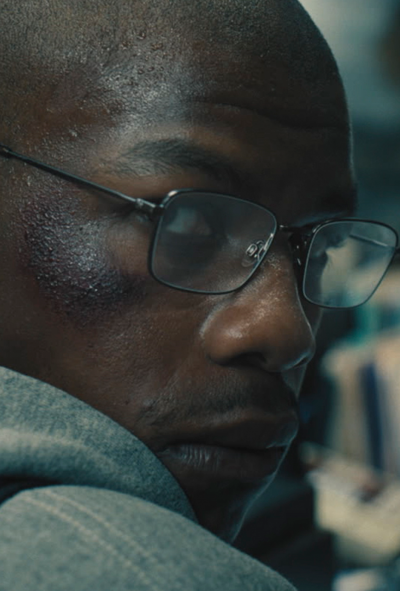
“892” (USA) (5/5) Web site
Justice ignored is indeed justice denied. What’s more, it’s an open invitation to things easily getting out of hand as the tension behind this is dialed up to an exaggerated level. That’s precisely what happens in this taut, fact-based drama about Iraq War veteran Brian Brown-Easley (John Boyega), whose VA disability benefits got lost in the bureaucracy and left him homeless and desperate – so much so that he took drastic measures to inform the public about his situation and that of many of his peers. Director Abi Damaris Corbin’s second feature outing is a riveting, albeit disturbing, watch from start to finish, casting a long shadow of shame on those who lack the decency and humanity to care for those who made the effort to care for us. The picture’s stellar ensemble cast, which captured the 2022 Sundance Film Festival Award in this category, is superb across the board, featuring the best portrayal ever turned in by Boyega (who has come a long way from his “Star Wars” outings) and an excellent performance by the late Michael K. Williams in one of his final roles. This Sundance Dramatic Grand Jury Prize nominee is by no means an easy film to screen, but it’s one that anyone interested in seeing justice served should watch – and take action about to see that it’s not denied again.
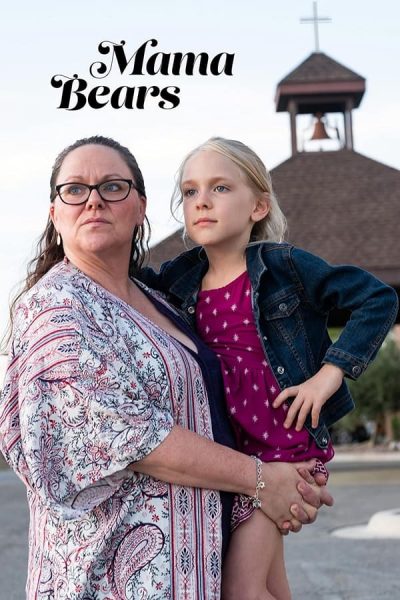
“Mama Bears” (USA) (5/5) Web site
When faced with a hard choice, what is one to do? For the fundamentalist Christian mothers of LGBTQ+ children, that’s a key question when it comes to accepting or denying the truth about their kids. The decision is often dictated to them by their religious leaders, a clear-cut judgment that’s supposed to be embraced without question, summarily swept under the rug quickly and presumably easily. But, for some parents in this situation, that’s not the case, for they love their children, no matter who they may be or whatever lifestyles they have chosen to adopt. Yet, at the same time, out of fear for what their peers will say, they’re hesitant to step forward, follow their hearts and reject what they’re told to do. That’s not the case, however, for the Mama Bears, a group of courageous Christian women who have chosen to defy the dictates and do what they know in their hearts is right – love and accept their kids, regardless of the consequences. Director Daresha Kyi’s superb documentary of this courageous movement follows the history of its founding, growth and activism, along with profiles of three mothers who have sought to come to terms with their gay, lesbian and trans children and love them just the same. This inspiring film about heroic parents conveys an uplifting message without becoming indignant, preachy or heavy-handed. Rather, it shows that love is love and deserves to be respected no matter what form it takes – and regardless what the close-minded of society may think.

“Memory Box” (Lebanon/Canada/France/Qatar) (5/5) (Rotten Tomatoes: ****+) Web site Trailer
When we think we know someone but subsequently find out we don’t know that individual at all, the impact can be surprising, if not disillusioning, especially when it involves someone close, like a family member. That’s the experience of Alex (Paloma Vauthier), a young Canadian woman of Lebanese descent, who discovers that her mother, Maia (Rim Turki), is not the person she thought she was. It’s a revelation that comes about when Maia receives a package filled with memorabilia from her upbringing in Beirut during the 1980s Lebanese Civil War, a time of devastating trauma mixed with a wondrous coming of age experience. Maia is not anxious to review the contents of the box, despite the many questions posed by Alex regarding the stockpile of notebooks, photos and cassette tapes contained therein. She even goes so far as to forbid Alex from reviewing the materials or asking about them, an order that’s promptly and secretively ignored. By reading the journals, looking at the pictures and listening to the recordings, she discovers things about her mother’s younger self (Manal Issa) that she never knew – tragedies she experienced, passions she possessed but has since abandoned, secrets about her extended family and loves lost – events that changed Maia drastically from the person she used to be in her youth. And, when Maia learns that Alex has been clandestinely perusing these materials, it sets up a confrontation, a dialogue and a metamorphosis that neither of them previously saw coming. In their fourth narrative collaboration, directors Joana Hadjithomas and Khalil Joreige have produced an engaging film that captivates throughout, capably nurturing the level of suspense and zapping viewers with carefully crafted, intensely moving disclosures, followed by moments of heartbreak, rebirth and encouragement. Despite a slight tendency to drag a bit toward the end of the first hour, “Memory Box” deservedly earns the interest it garners and the emotions it evokes across a wide spectrum of feelings, all told through a story that takes place during a period in history that has previously received precious little cinematic attention. This one is well worth a watch.

“Scarborough” (Canada) (5/5) Web site Trailer
Living life on the edge may not breed much hope for the future, yet it’s amazing how often those who struggle under such conditions manage to hold out expectations for its arrival. Such is the message of this incredibly stirring release about the lives of a group of occupants of the Toronto neighborhood of Scarborough, a low-income section of the city that’s home to many immigrant and working class residents. This often-gritty, sometimes-heartwarming, occasionally heartbreaking coming of age tale focuses on the lives of four kids (Liam Diaz, Mekiya Fox, Anna Claire Beitel, Felix Jedi Ingram Isaac) and their parents, all of whom become acquainted through their interaction at a literacy center run by a compassionate facilitator (Aliya Kanani) who does her best to provide as much assistance and support as her resources will allow. The result is a realistic but supremely touching film that exudes a spirit and magic of its own, reaching out to viewers, drawing them in and never letting them go until the lights come up. That’s quite an accomplishment for a picture with a runtime of almost 2:20:00, one that moves by at a steady pace that never sags or grows tiresome. Directors Shasha Nakhai and Rich Williamson have turned out a truly remarkable debut offering deserving of its eight 2021 Canadian Screen Awards (on 11 total nominations), including best picture, first feature, actor, supporting actress, director, adapted screenplay, casting and sound editing. This was without a doubt my favorite film of the festival, a picture truly deserving of a general release for the hope it instills even when things are at their bleakest.

“Beyond the Infinite Two Minutes” (“Droste no hate de bokura”) (Japan) (4/5) (Metacritic: 8/10, Rotten Tomatoes: ****) Web site Trailer
Imagine what it might be like to look into a TV screen and see into the future. Granted it’s only two minutes, but, when those who stumble onto this remarkable technology figure out how to manipulate it to extend that time window, all kinds of exciting possibilities surface. Unfortunately, more than a few unexpected hiccups occur, too, some with potentially dire consequences. Such is the scenario presented to an overwhelmed café owner/musician (Kazunari Tosa), his staff, his friends and a would-be romantic interest (Aki Asakura) in this wacky Japanese sci-fi comedy. Filmmaker Junta Yamaguchi’s one-shot direction of writer Makoto Ueda’s cleverly penned screenplay is loaded with laughs, even if the script becomes somewhat repetitive at times as the basic premise of the narrative needs to be recapped for new characters each time they’re introduced in the storyline. However, the manic level of humor here is infectious in ways that only Japanese cinema seems to be able to pull off, tickling viewers’ funny bones in virtual perpetuity. You’ll never look at time – or TV – in the same way ever again.
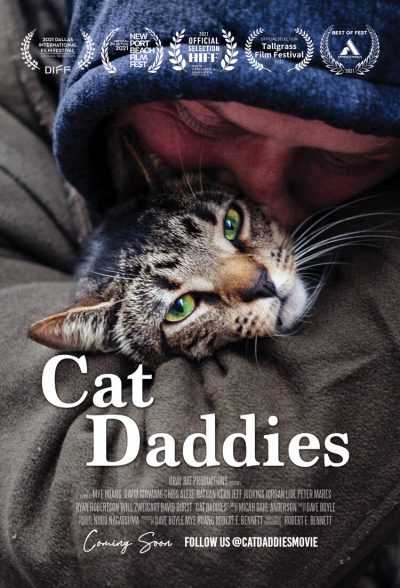
“Cat Daddies” (USA) (4/5) Web site Trailer
Director Mye Hoang’s adorable documentary about our furry feline friends is the kind of movie that will undeniably have viewers going “awwwwwwwwwwwww!” at least once every five minutes. This affectionate tribute to the cats of the world, as told through the stories of their adoring male owners, showcases the genuine unconditional love they reciprocally hold for one another. With tales ranging from a cat-loving actor to a truck driver who crisscrosses the country with his fuzzy four-legged companion to a homeless New York construction worker who rescued a kitten and made a friend for life, among others, the film can’t help but lift our spirits and fill us with an abundance of warmth, tenderness and goodwill. Perhaps the only fault I could find with this offering was its premise that it’s now supposedly become acceptable for big, strong, macho men to enjoy the company of their feline friends, an idea once seen as an indication of questionable masculinity. However, I find the need to express this allegedly revelatory notion as itself inherently archaic; after all, real men have been eating quiche and enjoying the companionship of cats for quite a long time now, and trying to claim that this is a “new” idea is outdated, something that could have easily been relegated to a footnote or passing reference (one need only look back to the examples set in movies like “Harry and Tonto” (1974) to see that this idea is anything but revolutionary). That aside, however, this is a delightful watch that will surely have you purring by film’s end.
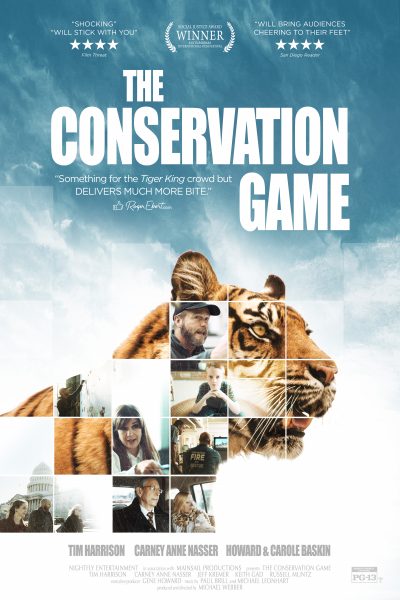
“The Conservation Game” (USA) (4/5) (Rotten Tomatoes: ****) Web site Trailer
We’ve all no doubt seen (and likely adored) those TV talk show segments and cable programs featuring wild animals with expert handlers promoting the need to protect these magnificent and cuddly creatures, many of which are endangered and dependent on zoos and sanctuaries for safety. But, as director Michael Webber’s damning new documentary reveals, those allegedly well-meaning media appearances by “ambassador animals” are a sham. Indeed, most of them are little more than a front for a clandestine network of deceit in the trade, auctioning, sale, and private ownership and exhibition of exotic wild animals, many of which make their debut on these television shows and then vanish into this murky underworld, where they receive questionable care and protection, jeopardizing their well-being and that of their owners and the public at large. This troubling investigation follows the efforts of animal welfare professional Tim Harrison into the whereabouts of disappeared ambassador animals (primarily big cats) through a series of probes into, and encounters with, the likes of well-known handlers and wildlife conservationists Jack Hanna, Dave Salmoni, Boone Smith and Jarod Miller, all of whom have carefully cultivated glowing reputations far different from the nature of the actions in which they routinely engage. It also follows the efforts of Harrison and colleagues to secure the passage of federal legislation prohibiting the private ownership of exotic wild animals, a campaign in which powerful opponents have fought against its enactment, even by nefarious and illegal means. The result is an eye-opening, revelatory exposé, one that will undoubtedly shatter many cherished illusions held by fans and followers of these supposed animal advocates. While some of the material in the film could have been a little better organized, especially in light of the complicated and disturbing web of deception involved, the message nevertheless comes through loud and clear, one that should positively infuriate anyone who claims to be a committed and concerned animal lover.
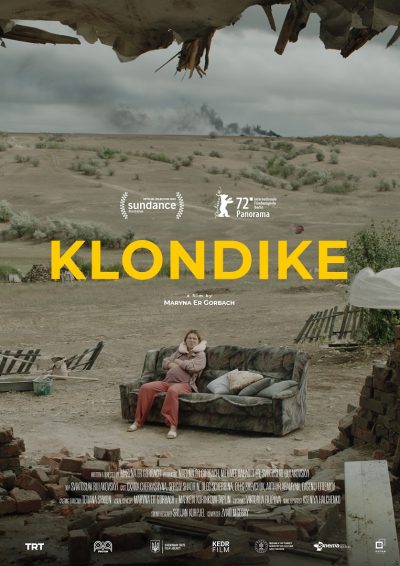
“Klondike” (Ukraine/Turkey) (4/5) Web site Trailer
Standing one’s ground in the face of extreme adversity – especially in dealings in which one has no vested stake in the outcome – can prove to be exceedingly frustrating and difficult. So it is for a farming couple (Oksana Cherkashyna, Sergey Shadrin) on the verge of becoming first-time parents in rural eastern Ukraine near the Russian border in 2014. They merely want to live out their lives in peace and quiet. Unfortunately, circumstances won’t allow that in this heart-wrenching story as the divisive separatist conflict heats up and authorities search for culprits in the nearby downing of Malaysia Airlines Flight MH17 with an errant missile strike that killed everyone on board. In the midst of all this, life for the unwitting bystanders grows ever more complicated as they struggle with these conditions, causing strain not only in their community, but also in their relationship at a time that should be one of great joy with their newborn’s impending arrival. Writer-director Maryna Er Gorbach paints a powerful but grim picture of life in this troubled region (the relevance of which is undeniably even greater these days), frequently depicting the atrocities and hardships with long, slow panning shots that make viewers feel like cold, detached but nonetheless affected observers of what’s playing out before them. Though the pacing is occasionally slow and the narrative somewhat episodic, the film is consistently mesmerizing, a quality that helped earn it the 2022 Sundance Film Festival Award for best director in the World Cinema – Dramatic competition, along with a nomination for the event’s Grand Jury Prize in the same category. While “Klondike” may be a heartbreaker, it nevertheless delivers a powerful message that we should all heed for a troubled people beset by tragedies that they neither wanted nor deserved – and that, regrettably, have carried on to this day.
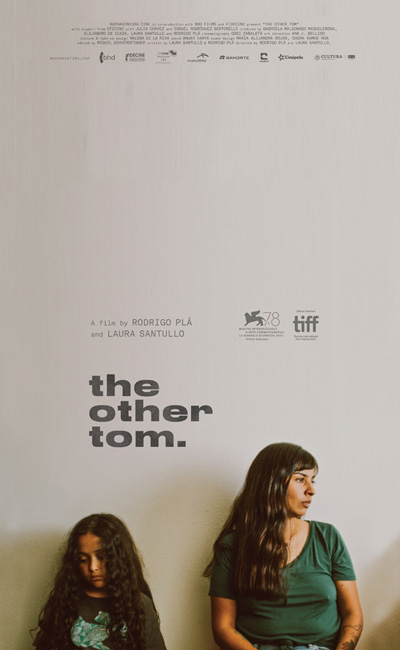
“The Other Tom” (“El otro Tom”) (Mexico) (4/5) Web site Trailer
When does concerned helpfulness turn into invasive intrusiveness? For the parents of children suffering from conditions like ADHD, there’s a fine line between the two, and it can easily get crossed by allegedly well-meaning but overbearing psychiatric professionals and government agency representatives. Those are the circumstances faced by Elena (Julia Chavez), an immigrant Mexican single mother living in Texas with her hyperactive nine-year-old son, Tom (Israel Rodriguez). When Tom’s uncontrolled hyperactive behavior leads to compelled drug therapy that comes with side effects and potentially serious ramifications, a fiercely determined Elena becomes increasingly defiant when her choices as a parent are systematically taken away from her by those who are dismissive of her genuine concerns that Tom’s treatment may be causing more harm than good. The film presents a checklist of scenarios that could occur under conditions like these, and directors Rodrigo Plá and Laura Santullo paint a compelling picture of what can happen. However, after these various situations play out, the film becomes somewhat lost in the final 30 minutes. It’s as if the picture runs out of story and doesn’t quite know how to wrap things up, an unfortunate development after what had been an otherwise-solid start. Nevertheless, this commendable offering does a fine job of conveying its core message, thanks in large part to the excellent performances of Chavez and Rodriguez, both of whom effectively convey the challenges and concerns faced by mother and son under circumstances like these, a powerful cautionary tale for others who are similarly situated.
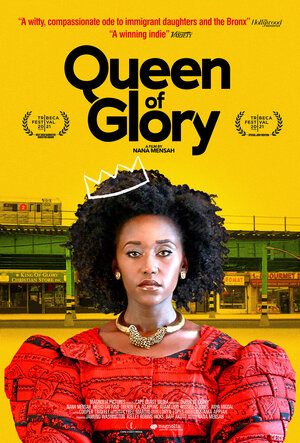
“Queen of Glory” (USA) (4/5) Web site Trailer
To paraphrase an old adage, you can take someone out of their native culture, but you can’t take the native culture out of that person. So it is for Sarah Obeng (Nana Mensah), a young Ghanaian-American doctoral student/scientist at Columbia University who has endeavored to become Americanized, distancing herself from what she sees as her folksy, homespun roots, including the attitudes and practices of many of her uber-Christian, uber-chauvinistic family members. She’s also made plans to move to Ohio with her boyfriend, Lyle (Adam Leon), to start a new life. All of those plans get sidetracked, however, by her mother’s sudden death, leaving her to sort out matters related to mom’s funeral and her estate, which includes her home and a business – a saccharin-encrusted Christian bookstore. Needless to say, this leaves the beleaguered protagonist in a pickle – does she follow her dreams or remain loyal to her roots (particularly when family members engage in more than a little less-than-subtle arm-twisting)? Actor-writer-director Mensah’s delightfully wry comedy tickles the ribs with wickedly funny humor that many of us who come from overbearing families can readily appreciate, frequently with vibes reminiscent of films like “Shiva Baby” (2020), “Home for the Holidays” (1995) and “The Forty-Year-Old Version” (2020). And, for its efforts, “Queen of Glory” earned two 2021 Independent Spirit Award nominations for best first feature and the supporting performance of Meeko as Pitt, an ex-con bookstore employee, one of many colorful supporting players in the film. A few sequences feel a little drawn out, but this is a film with its heart – and funny bone – in the right place, making for an agreeably amusing watch.
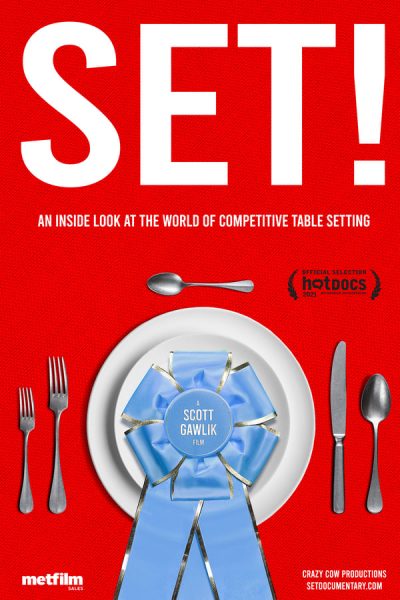
“Set!” (USA) (4/5) (Rotten Tomatoes: ****) Web site Trailer
Were it not for this film, one might think its eccentric subject matter was something featured in a satirical piece in The New Yorker or on a CBS Sunday Morning segment, if not an outright fabrication. However, director Scott Gawlik’s tongue-in-cheek documentary chronicles the polite but cut-throat world of competitive table setting as seen through the eyes of a number of entrants in California’s Orange County Fair contest. As daffy and offbeat as all of this may seem, it’s a deadly serious undertaking for this determined band of wannabe Martha Stewarts, who’ll generally go to great lengths in terms of time, money and effort to take home their prized ribbons. In telling the individual stories of these contestants, the film explores the diverse outlooks with which they approach the competition, as well as their various personal motivations for participating in something many of us might find trivial, inconsequential and fraught with the nitpicking rules of proper table etiquette. However, when viewers see the artistry involved in these settings, as well as the pride their creators take in their design and assembly, it’s apparent this is an art form all its own, if a bit esoteric and quirky and, at times, even astonishingly thought-provoking. Like the table presentations themselves, the film showcases its material in meticulous detail, perhaps even more so than what many viewers may want to know, making for an offering that arguably goes on a little longer than expected or desired. But this offering nevertheless introduces us to a world many of us have probably never seen or even been aware of, and it does so with a delightfully cheeky, wry sense of humor and ample place setting eye candy. Bon appétit!
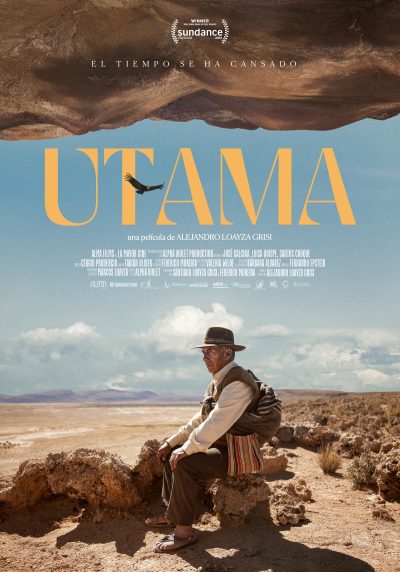
“Utama” (“Our Home”) (Bolivia/Uruguay/France) (4/5) Web site Trailer
Knowing when to hold on and when to let go can be fraught with difficult, emotionally charged choices. So it is for an aging farming/ranching couple (José Calcina, Luisa Quispe) in the Bolivian highlands, where they have been facing an unusually long and devastating drought that threatens their way of life, not to mention their very existence. In their attempt to hang on, life becomes increasingly difficult, forcing them to consider their options, especially when their grandson (Santos Choque) visits and puts the question to them directly. Director Alejandro Loayza Grisi’s debut feature tells an intensely meditative heart-tugging tale photographed with stunningly gorgeous cinematography, backed by the fine performances of Calcina, Quispe and Choque, all in their premiere roles. There are some noticeable issues with the subtitling, and the pacing in the second half can be somewhat sluggish at times, but the film gets far more right than not. And, for its efforts, this thoughtfully insightful offering captured the 2022 Sundance Film Festival Grand Jury Prize in the World Cinema – Dramatic competition. This fine release is well worth a look, especially in a world where the cycle of death and rebirth has become such a profound element in environmental, cultural and spiritual circles, aspects of life that ultimately touch us all.
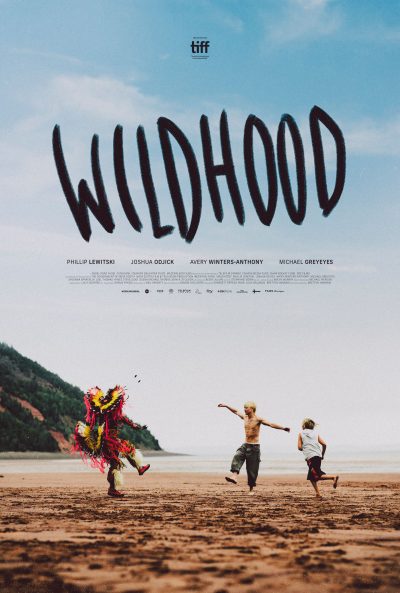
“Wildhood” (Canada) (4/5) Web site Trailer
Finding acceptance with others begins with finding acceptance with ourselves, a process that’s often far from easy, especially when the odds are seemingly stacked against us. That’s the position in which Lincoln (Phillip Lewitski), a troubled adolescent of mixed White and indigenous American heritage, finds himself while living with his younger half-brother, Travis (Avery Winters-Anthony), and his physically and emotionally abusive father, Arvin (Joel Thomas Hynes), in a rundown trailer park in eastern Canada. To compound matters, he learns that his supposedly deceased Native Canadian mother is, in fact, probably alive, exposing a lie long perpetuated by his toxic dad. And, on top of that, he’s trying to come to terms with his emerging gay sexuality, a process that leaves him with lots of questions. But, when things finally become intolerable at home, Link and Travis flee, hitting the road on a quest to find his mother, as well as his own heart, a process spurred on when he meets Pasmay (Joshua Odjick), an indigenous pow wow dancer who shares his circumstances – and his feelings. Writer-director Bretten Hannam’s debut feature tells a moving, sensitive story with beauty, grace and warmth as a young man discovers himself, his family and the love of someone with whom he just might be able to make a life. With dialogue in English and native Mi’kmaq, the story rings true in two cultures, though the subtitling of the indigenous material is, unfortunately, sometimes incomplete, offering no translation. There’s also a slight tendency for the narrative to meander in the final half-hour. These issues aside, however, the film nevertheless earned six Canadian Screen Award nominations, including a win for Odjick for best supporting actor. Indeed, “Wildhood” presents a compelling and touching saga about how to find that missing acceptance and translate it into a life worth living.
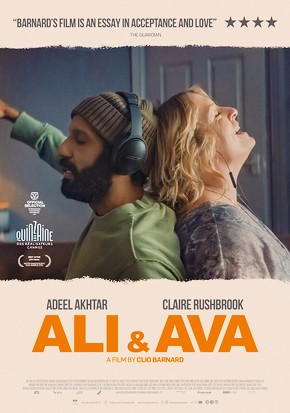
“Ali & Ava” (UK) (3/5) (Rotten Tomatoes: ***) Web site Trailer
Love stories have been a staple of the movie industry almost as long as there have been movies. But, for such releases to truly stand out, they must offer something distinct to distinguish themselves in this genre. Writer-director Clio Barnard’s latest does its level best to achieve that, but, regrettably, it comes up short. Set in a working class neighborhood of Bradford, West Yorkshire in the north of England, the film follows the choppy, often-meandering relationship of its two title characters, Ava (Claire Rushbrook), a widowed, middle-aged immigrant Irish Catholic grandmother, and Ali (Adeel Akhtar), a somewhat younger British-Pakistani would-be musician who’s separated from his wife, Runa (Ellora Torchia). In entering into their passionate but tentative romance, Ali and Ava are each carrying their fair share of baggage (conditions that no doubt contribute to their hesitancy to become deeply involved) while attempting to cope with outside issues related to cultural taboos and less-than-subtle racism. However, despite the picture’s efforts at creating distinctive characters operating under a distinctive set of circumstances, the narrative never comes together as cohesively as it might have, yielding a patchwork of moments of varying degrees of intensity and engagement, a mix that doesn’t quite gel. For every scene that effectively draws in viewers, there are just as many that are shallow, extraneous throw-aways. What’s more, the story lines related to the outside issues aren’t developed nearly as fully as they could have been. To be sure, the film features fine performances by Akhtar and Rushbrook as the two leads, but, considering the ample critical acclaim that has been lavished on this offering, as well as its two BAFTA Award nominations, “Ali & Ava” nevertheless proves to be something of a disappointment. This attempt at creating a profound love story could have benefitted greatly from some much-needed shoring up in a number of key areas – especially as an offering in a genre that inherently calls for distinction to genuinely stand out.

“A Distant Place” (South Korea) (3/5) Web site Trailer
When it comes to stories built on the gradual revelation of secrets, there’s a big difference between skillfully divulging their disclosure and being tight-fistedly cryptic. Where director Kun-Young Park’s second feature is concerned, viewers get a mix of both. This tale follows Jin-woo (Kang Gil-woo), a closeted gay farm worker living in rural South Korea after leaving Seoul to pursue a more tranquil and reclusive existence, in his efforts at building a new life for himself and Seol (Kim Si-ha), the adorable five-year-old he’s raising. But conditions change drastically with the arrival of his partner, Hyeon-min (Kyung Hong), and a surprise visit by his long-estranged twin sister, Eun-yeong (Sang-hee Lee), throwing circumstances into significant disarray and prompting the exposure of a number of long-concealed family secrets. Unfortunately, the film’s handling of these developments is wildly uneven, some presented with tremendous narrative dexterity and others with needless murkiness and ambiguity, right up to the end. It’s regrettable that the wrinkles in the story line weren’t ironed out better, especially when compared to the plot elements that are deftly deployed. It makes for an odd, sometimes-frustrating combination, undermining the aspects that are handled adeptly. To its credit, this offering features a fine ensemble cast, gorgeous cinematography, an atmospherically ethereal score and pleasantly meditative pacing, but it’s disappointing that the film fails to blend these assets with those elements that come up short to create a more cohesive and cogent whole. Now that would have made for quite a picture.
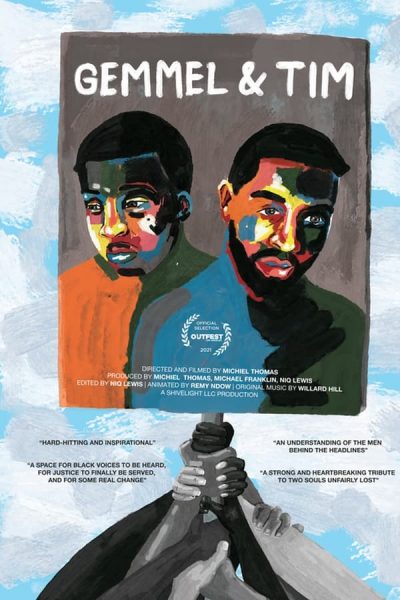
“Gemmel and Tim” (USA) (3/5) Web site Trailer
Delving into the murky waters of a criminal investigation can be tricky business. So it was in the questionable deaths of two gay Black men, Gemmel Moore and Timothy Dean, in less than two years at the West Hollywood home of well-connected Democratic Party donor Ed Buck. Both men succumbed to drug overdoses that were officially labeled accidental, but were they really? Given Buck’s reputation for hiring escorts to engage in various drug-related sexual fetishes, it was widely believed that his actions may have contributed to the deaths of the two men. But how far did that involvement extend? Was it negligence that led to their passing, or was it murder? That’s what director Michiel Thomas’s documentary attempts to uncover. Through interviews with those who knew Gemmel and Tim, as well as a wealth of archive news footage of the story as it unfolded, the film seeks to piece the tragedy together. It’s on this point, however, where the film muddies the waters somewhat. While the picture paints an unfettered, heartfelt portrait of the feelings of the victims’ devastated survivors, it’s not always as clear as it probably could have been when it comes to spelling out exactly what Buck might be guilty of. The film often conveys impressions that are more in line with emotions than with the legal particulars of the case. And, while the film is careful not to misstate matters, that effort frequently becomes overshadowed by the shouting and misery, leaving viewers, at the very least, modestly confused by the actual specifics of the story. It’s a truly sad tale, to be sure, and what happened was indeed tragic, and, on that point, the film succeeds brilliantly in conveying the pain associated with these circumstances. It’s just unfortunate that it didn’t carry through as well as it could have on the more objective aspects of this heartbreaking misfortune.

“Sweetheart” (UK) (3/5) Web site Trailer
The coming out/coming of age narrative is a tried-and-true formula that has been done many times, but it’s always refreshing when such familiar territory is infused with distinctive characters and crisp writing. And that’s very much the case for the first half of this gay British romcom-melodrama, especially in the wry, insightful voice-over observations of A.J. (Nell Barlow), the film’s 17-year-old lesbian lead. When subjected to what she sees as the incessantly lame tedium of a family vacation at a tacky seaside resort, the patronizing protagonist agonizes over everything when not spouting condescending insights or wallowing in exaggerated bouts of adolescent angst. However, when she meets Isla (Ella-Rae Smith), a curvaceous bikini-clad lifeguard who seems to share a mutual attraction, A.J.’s interest is piqued, enabling her to emerge from her teenage ennui. But no sooner does this relationship begin to blossom when the narrative seems to lose its way, slipping into unfocused meandering and considerable inexplicable brooding. It’s unfortunate that what starts out so promising evaporates so completely, leaving viewers wondering where it’s going and undermining all of the cinematic goodwill it had built up in its first half. Director Marley Morrison’s debut feature reveals a filmmaker with ample potential, but future projects will require some shoring up to live up to that promise.
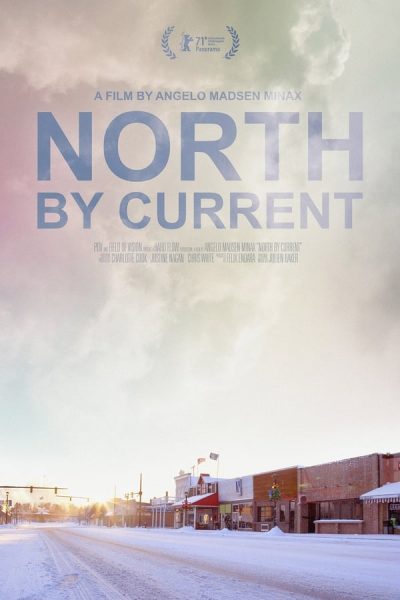
“North by Current” (USA) (2/5) (Metacritic: 4/10) Web site Trailer
It’s indeed gratifying when a documentary attempts to takes an unconventional approach in telling its story, presenting a work of nonfiction in an unexpected way. That’s particularly true for offerings that have highly personal components. However, to pull off such a result, the director of such an undertaking must have a clear vision to make things work, something that’s decidedly missing in this title created for the PBS series POV. Transgender male filmmaker Angelo Madsen Minax’s account of his dysfunctional Mormon family in a small western Michigan town spans five years, documenting events coming in the wake of the death of his two-year-old niece under mysterious circumstances. It’s a tragedy that brought a number of troubling issues to light – some legitimate, others falsely hatched out of sloppy investigative work, but all of which led to an array of painful outcomes. In telling this story, though, the filmmaker seeks answers to bigger questions that aren’t readily forthcoming. His attempt at making sense out of things comes up short, and that’s clearly reflected in the finished product, one that often makes little sense of its own. The attempted fusion of straightforward storytelling with poetic observations, home movie clips from his upbringing, arthouse cinematography and lofty philosophical musings simply doesn’t work. The picture often feels like it’s reaching to make a statement that it’s unable to articulate for itself, leaving viewers more puzzled than enlightened. This experiment is certainly commendable for its artistic audacity, but the result is a film that’s frequently inscrutable. As a nominee for the Independent Spirit Awards’ 2021 Truer Than Fiction Award, it’s apparent that the director possesses a singularly distinctive perspective, but he’ll obviously need to clarify it in a more accessible way in future projects to engage audiences rather than confound them.

“Me and the Beasts” (“Yo y Las Bestias”) (Venezuela) (1/5) Web site Trailer
Though billed as a deadpan comedy, director Nico Manzano’s debut feature prompts few laughs and leaves viewers mostly perplexed as to its message, purpose and intent. In telling the story of Andrés Bravo (Jesus Nunes). a musician who quits his band over performance disagreements to pursue a solo career, the film follows his frustrating exploits in trying to establish himself on his own. Artistically, he feels fulfilled with the new music he’s composing, thanks in large part to the assistance of a pair of oddly dressed “beasts” (though “muses” would probably be a more fitting word choice). However, when it comes to taking his creations to market, he runs into constant roadblocks, some brought on by poor choices, some due to the corrupt business practices and government policies in place in the downward spiraling Venezuelan economy. The result is a mix of hopefulness and frustration that keeps him from reaching his potential, not unlike the experience of many others in his country seeking to strike out on their own these days. Regrettably, the picture itself never reaches its potential, either, keeping viewers at bay with clumsy narrative and screenplay choices that generally just don’t work. It feels at times as if the film is an underdeveloped feature, while at other times it comes across as a padded short, filled with far too many extraneous, incidental story elements and bloated by tediously protracted, awkwardly orchestrated pacing. Its attempt at social allegory falls flat, too, never developing this aspect of the story as clearly and compellingly as it might have. In fact, perhaps the only saving grace here is the music itself, which is often totally mesmerizing; indeed, a concert film of the picture’s original compositions would probably have been far more preferable to what the filmmaker has come up with. In the end, a complete retooling is in order here to make its story and symbolism more engaging, entertaining, telling and tolerable.

“Samichay: In Search of Happiness” (“Samichay”) (Peru/Spain) (1/5) Web site
It’s one thing for a movie to strive for greatness; it’s something else to try too hard in achieving it. That’s the case with director Mauricio Franco Tosso’s debut feature about Celestino (Amiel Cayo), a destitute Andean subsistence farmer living with his daughter, Yaquelin (Raquel Florentina Saihua Huainaso), and mother-in-law, Agustina (Agustina Aurelia Puma de Ccallo). He struggles to make ends meet, his only potential source of income being his undernourished cow, Samichay (which, in Quechan, translates as “in search of happiness”). Celestino places high hopes on Samichay birthing a fine young calf, something that’s unlikely to happen given her health. But he soldiers on, despite these conditions and his unwillingness to accept a way of life that’s rapidly slipping away. The film thus examines the question of tradition vs. progress, life and death, and a man trying to hold on in the face of relentless change. Unfortunately, the premise here is actually rather thin, and the narrative feels padded to cover that shortcoming, relying on qualities like its beautiful black-and-white cinematography to cover the film’s central failing. But, despite such attempts at polishing the tarnish, and considering this work’s serious need of editing, this is a story that could probably be whittled down to a short quite handily. Instead, the use of artsy techniques to mask what is a simple tale dressed up in a feature-length package just doesn’t work. The result is a fundamentally boring offering that aspires to nobility with an inflated sense of itself that, sadly, rings quite hollow.
Copyright © 2022, by Brent Marchant. All rights reserved.

No comments:
Post a Comment